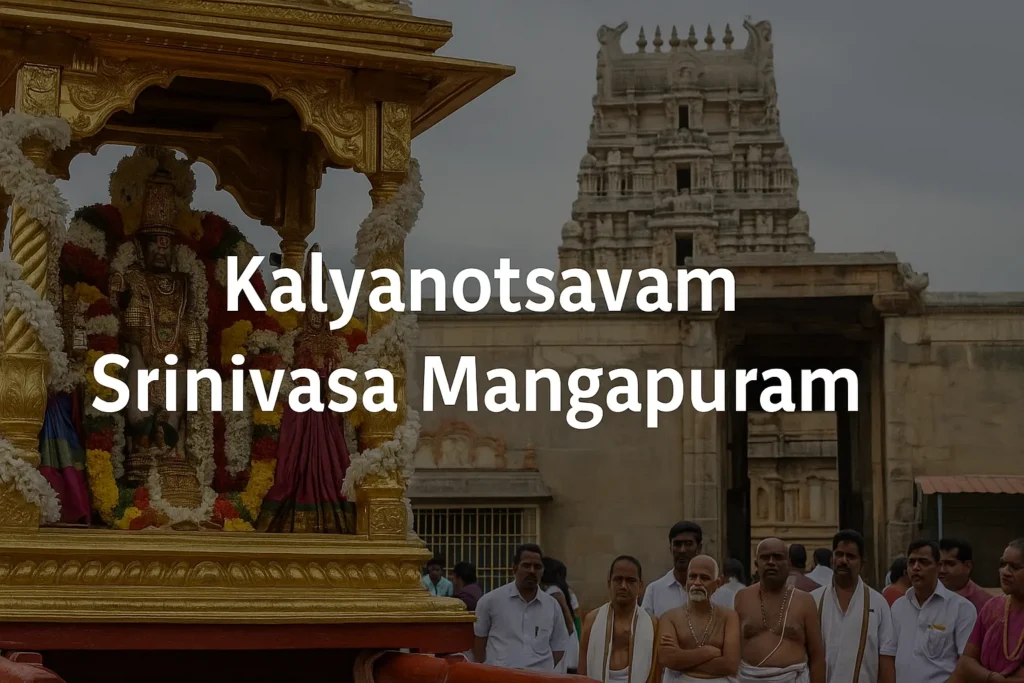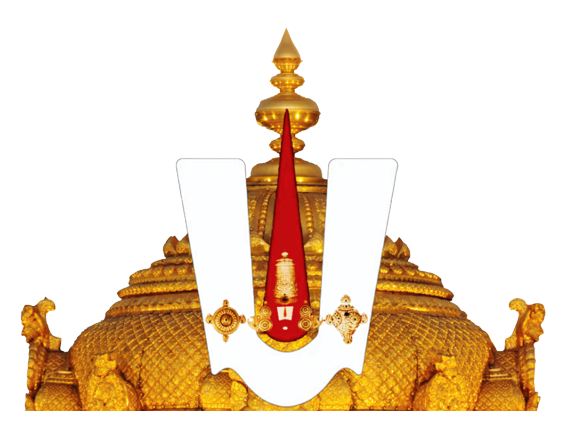Discover the daily Kalyanotsavam schedule at Srinivasa Mangapuram Temple near Tirupati. Learn about this divine wedding ceremony performed every evening at 6 PM, special festival dates, participation costs (₹100-₹10,000), booking process, and spiritual benefits from a temple priest’s perspective.
As a temple priest who has dedicated over three decades to studying and performing sacred rituals across various temples in South India, I have had the privilege of witnessing and conducting numerous Kalyanotsavam ceremonies at the Sri Kalyana Venkateswara Swamy Temple in Srinivasa Mangapuram. This divine wedding celebration holds profound spiritual significance, and understanding its schedule and participation process can enhance your pilgrimage experience significantly.

Table of Contents
The Sacred Abode: Srinivasa Mangapuram Temple
Nestled approximately 12 kilometers from the bustling pilgrimage city of Tirupati in Andhra Pradesh, Srinivasa Mangapuram is home to the Sri Kalyana Venkateswara Swamy Temple. This sacred shrine is unique in that it houses Lord Venkateswara in His divine wedding form alongside Goddess Padmavati—a representation that distinguishes it from the more famous Tirumala temple where the Lord is depicted in His sovereign aspect.
The temple dates back to the 14th century during the illustrious Vijayanagara Empire, as evidenced by inscriptions documented by the Tirumala Tirupati Devasthanams (TTD). The architecture follows the traditional Dravidian style with intricate carvings depicting various episodes from Hindu mythology, particularly those related to the celestial wedding of Lord Venkateswara and Goddess Padmavati.
What makes this temple particularly special is its focus on the marital aspect of divinity. In Hindu tradition, the union of Lord Venkateswara and Goddess Padmavati represents the perfect divine marriage, symbolizing the harmonious relationship between cosmic energies that sustains the universe. For devotees, this divine couple serves as the ideal exemplars of matrimonial harmony.
Understanding Kalyanotsavam: The Divine Wedding Ceremony
Kalyanotsavam, derived from the Sanskrit words “Kalyana” (wedding) and “Utsavam” (celebration), is a sacred ritual that recreates the divine wedding of Lord Venkateswara with Goddess Padmavati. As someone who has performed this ritual countless times, I can attest to its transformative spiritual power for both the participants and witnesses.
The ceremony consists of several meticulously performed rituals that follow the traditional Hindu wedding customs but are elevated to a divine context. These include:
- Alankaram (Divine Decoration): The deity idols are adorned with special wedding attire, including silk vastrams (garments), flower garlands, and ceremonial jewelry.
- Vedic Recitations: Priests recite specific Vedic hymns and mantras that invoke divine blessings for the celestial union.
- Mangalya Dharanam: The symbolic tying of the divine Mangalsutra (sacred thread) by Lord Venkateswara to Goddess Padmavati, representing the sacred bond of marriage.
- Talambralu: The showering of sacred rice mixed with turmeric and kumkum, symbolizing prosperity and fertility.
- Maangalya Dharanam Prasadam: Distribution of special consecrated food offerings that are believed to carry the divine couple’s blessings.
During my years of service, I have observed that devotees who witness this divine wedding with sincere devotion often report experiencing a profound sense of spiritual fulfillment. The ritual is believed to invoke divine blessings for marital harmony, fertility, prosperity, and the resolution of obstacles in one’s life journey.
Daily Schedule: Is Kalyanotsavam Performed Every Day?
One of the most common questions I receive from pilgrims planning their visit to Srinivasa Mangapuram concerns the schedule of Kalyanotsavam ceremonies. To answer directly: Yes, Kalyanotsavam is performed daily at the Srinivasa Mangapuram Temple.
The regular schedule for Kalyanotsavam at Srinivasa Mangapuram is as follows:
- Morning Kalyanotsavam: Not regularly performed except on special festival days
- Evening Kalyanotsavam: Performed daily between 6:00 PM and 7:00 PM
The ritual typically lasts for 45-60 minutes, depending on the specific day and whether any special ceremonies are incorporated. The TTD, which administers the temple, ensures that this daily schedule is maintained throughout the year, barring exceptional circumstances like temple renovations or special religious observances that might temporarily alter the timing.
It’s worth noting that while the Kalyanotsavam is performed daily, the scale and grandeur of the ceremony vary depending on the day of the week and specific festival occasions. For instance, the Friday Kalyanotsavam is considered particularly auspicious and is usually conducted with additional rituals and greater ceremonial detail.
During my tenure performing and observing these rituals, I’ve noted that the temple adheres strictly to this schedule, and devotees can rely on the evening Kalyanotsavam taking place daily. According to records maintained by temple authorities and referenced in Temple Net’s comprehensive temple database, this tradition has been consistently observed for several centuries.
Special Days and Festival Kalyanotsavam
While Kalyanotsavam is performed daily, certain days hold special significance and are considered particularly auspicious for witnessing this divine wedding ceremony. Based on my decades of experience in temple rituals, I recommend planning your visit on these special occasions if possible:
Weekly Special Days
- Fridays: Dedicated to Goddess Lakshmi and considered the most auspicious day for Kalyanotsavam. The Friday ceremony is conducted with additional rituals and special offerings.
- Saturdays: Associated with Lord Venkateswara and believed to be effective for removing obstacles in married life.
Monthly Auspicious Days
- Purnima (Full Moon): Kalyanotsavam performed on full moon days carries special spiritual potency.
- Ekadashi (11th day after new/full moon): Considered sacred for Lord Vishnu worship, making the Kalyanotsavam on these days particularly significant.
Annual Festivals
- Annual Brahmotsavam: Usually celebrated in February-March (according to the Hindu lunar calendar). The Kalyanotsavam during this nine-day festival is performed with exceptional grandeur and elaborate rituals.
- Vaikuntha Ekadashi: The Kalyanotsavam on this day is believed to bestow special blessings for moksha (spiritual liberation).
- Rathasapthami: Celebrated as the divine chariot festival, the Kalyanotsavam on this day symbolizes cosmic harmony.
- Garuda Seva: Special Kalyanotsavam performed after the Lord’s procession on Garuda (divine eagle vehicle).
According to the Andhra Pradesh Tourism records, these special occasions attract significantly larger crowds, sometimes exceeding 10,000 devotees compared to the regular daily attendance of 1,000-2,000 visitors. Based on my observations over the years, the spiritual experience during these special Kalyanotsavam ceremonies is indeed distinctive, with a palpable elevation in the collective devotional energy.
How to Participate in Kalyanotsavam
For devotees wishing to participate in the Kalyanotsavam at Srinivasa Mangapuram, there are several options available, ranging from simple darshan (viewing) to more involved participation. Drawing from my experience guiding countless pilgrims through this process, here’s a comprehensive guide:
Types of Participation
- General Darshan: Free participation where devotees can witness the Kalyanotsavam from the general assembly area.
- Special Darshan: Paid tickets (typically ₹100-₹500) that allow closer viewing of the ceremony.
- Kalyanotsavam Sevasartham: Special participation package (₹1,001-₹2,501) where devotees can offer vastrams (garments) and other ceremonial items for the divine couple.
- Samprokshana Sevasartham: The most involved participation (₹5,001-₹10,001) where couples, particularly newly married ones, can perform specific rituals alongside the priests during the ceremony.
Booking Process
Based on my experience assisting devotees with their bookings, here’s the process to secure your participation:
- In-Person Booking: Available at the temple counter or at TTD information centers in Tirupati town.
- Online Booking: Through the official TTD website (reservations typically open 30 days in advance).
- Phone Booking: Through the TTD call center (for confirmed dates only).
- Travel Agent Booking: Authorized TTD agents can also facilitate bookings for a nominal service charge.
For the special and sevasartham participation categories, I strongly recommend booking at least 15-30 days in advance, especially during festival seasons or weekends, as these slots fill quickly. During my time guiding devotees, I’ve observed that last-minute bookings are often unsuccessful during peak periods.
Requirements for Participation
To ensure a smooth and spiritually fulfilling experience, participants should note these requirements:
- Dress Code: Traditional attire is mandatory – dhotis or formal pants with upper cloth for men; sarees or salwar kameez for women.
- Personal Information: Provide accurate personal details during booking, including gotram (lineage) for those participating in sevasartham.
- Arrival Time: Arrive at least 30-45 minutes before the scheduled time for verification and seating arrangements.
- Optional Offerings: For enhanced participation, devotees can bring additional offerings like fruits, flowers, and coconuts.
- Documentation: Carry a valid ID and booking confirmation to the temple.
As someone who has guided numerous devotees through this process, I can affirm that proper preparation enhances the spiritual experience significantly. For more detailed information on temple protocols and broader pilgrimage planning, you might find this complete guide to Tirupati temples helpful for contextualizing your Srinivasa Mangapuram visit within the larger sacred geography of the region.
Spiritual Benefits of Witnessing Kalyanotsavam
Having observed the transformative impact of Kalyanotsavam on countless devotees over three decades, I can attest to the profound spiritual benefits believed to accompany participation in this divine wedding ceremony:
Blessings for Marital Harmony
The foremost blessing sought by witnessing Kalyanotsavam is marital harmony. The divine union of Lord Venkateswara and Goddess Padmavati represents the perfect cosmic balance between Shiva (consciousness) and Shakti (energy) principles. Witnessing this divine union is believed to infuse these harmonious qualities into one’s own marriage.
Removal of Obstacles to Marriage
For unmarried individuals seeking life partners, witnessing Kalyanotsavam is considered particularly effective in removing obstacles to finding suitable matches. The divine energy of the ceremony is believed to clear karmic hindrances that may be delaying marriage prospects.
Blessings for Progeny
Couples desiring children often participate in Kalyanotsavam with special prayers for conception and healthy offspring. The divine couple’s blessings are considered especially potent for addressing fertility challenges.
Overall Prosperity and Well-being
Beyond matrimonial benefits, Kalyanotsavam is believed to bestow general prosperity and well-being. The combination of Lord Venkateswara (representing wealth and divine grace) and Goddess Padmavati (representing abundance and compassion) creates a powerful blessing for holistic prosperity.
Spiritual Elevation
From a deeper philosophical perspective, the union celebrated in Kalyanotsavam represents the merger of the individual soul with the divine—the ultimate spiritual goal in Hindu philosophy. Witnessing this ceremony with proper spiritual understanding can elevate one’s consciousness and devotional fervor.
During my years of priesthood, I’ve collected numerous testimonials from devotees who experienced remarkable improvements in their marital relationships, conceived children after years of trying, or found suitable partners shortly after participating in Kalyanotsavam with sincere devotion. While scientific validation of such outcomes remains challenging, the consistency of positive testimonials across diverse demographics is noteworthy.
Personal Experiences and Testimonials
Throughout my decades of service at various temples, including frequent visits to Srinivasa Mangapuram, I’ve witnessed countless transformative experiences of devotees participating in Kalyanotsavam. These personal accounts provide valuable insights into the ceremony’s impact on individual lives:
Restored Marital Harmony
Ramesh and Sunita from Hyderabad had been experiencing marital discord for several years. On my recommendation, they participated in the Friday Kalyanotsavam at Srinivasa Mangapuram with sincere prayers for harmony. Six months later, they returned to express gratitude, sharing that the experience had initiated an inexplicable positive shift in their relationship. “It was as if we remembered why we chose each other in the first place,” Sunita explained.
Blessing of Children
Perhaps the most common testimonials come from couples seeking the blessing of children. Venkat and Lakshmi from Chennai had been childless for eight years despite various medical interventions. After participating in Kalyanotsavam during the Brahmotsavam festival, they conceived within three months. They named their daughter Padmavati in devotional gratitude to the divine mother.
Finding Life Partners
Karthik, a software professional from Bangalore, had faced repeated disappointments in his search for a life partner. After participating in Kalyanotsavam, he experienced a remarkable coincidence – meeting his future wife during his return journey from the temple. They now visit annually on their wedding anniversary to express gratitude.
Spiritual Transformation
Beyond material blessings, many devotees report profound spiritual awakenings. Anjali, a corporate executive from Mumbai, shared that witnessing Kalyanotsavam triggered a spiritual journey that transformed her outlook on life. “Something changed in how I perceived relationships – not just my marriage, but all relationships in my life became more harmonious,” she recounted.
While these testimonials represent individual experiences and should not be interpreted as guaranteed outcomes, they reflect consistent patterns I’ve observed over decades. The sincere devotion and receptiveness of the participants seem to be crucial factors in manifesting these blessings.
Practical Tips for Visitors
Based on my extensive experience guiding pilgrims to Srinivasa Mangapuram and other sacred sites, here are practical recommendations to enhance your Kalyanotsavam experience:
Best Time to Visit
- Weather Consideration: September to February offers the most pleasant climate for visitors.
- Crowd Management: Weekday mornings typically have lower footfall compared to weekends and evenings.
- Spiritual Timing: If possible, align your visit with auspicious days like Fridays or Purnima for enhanced spiritual significance.
Transportation Options
- From Tirupati: Regular buses operate from Tirupati bus stand to Srinivasa Mangapuram approximately every 30 minutes.
- Private Transport: Taxis from Tirupati cost approximately ₹500-700 for a round trip with waiting time.
- From Tirumala: After Tirumala darshan, direct buses are available to Srinivasa Mangapuram during daytime hours.
Accommodation
While Srinivasa Mangapuram has limited accommodation options, nearby Tirupati offers numerous choices:
- TTD Accommodations: Affordable and reliable, but require advance booking through the TTD website.
- Private Hotels: Range from budget (₹800-1,500) to luxury (₹3,000-10,000) options in Tirupati.
- Dharamshalas: Budget-friendly options for pilgrims seeking basic facilities.
I typically recommend staying in Tirupati and making a day trip to Srinivasa Mangapuram, as this offers better accommodation quality and accessibility to other nearby temples.
Essential Items to Carry
- Offerings: Traditional offerings include coconuts, fruits, flowers, and new clothes for the deity.
- Personal Items: Carry a water bottle, small towel, and basic toiletries.
- Documentation: Keep your ID proof and booking confirmation (if applicable) readily accessible.
- Attire: Pack traditional clothing suitable for temple visits.
Photography and Mobile Restrictions
Based on current temple policies, photography is generally restricted inside the main sanctum. Mobile phones must be switched off or kept in silent mode during the ceremony. For commemorative photographs, utilize the services of authorized temple photographers available outside the main shrine.
Combining with Other Sacred Sites
For a more comprehensive spiritual journey, consider combining your visit with these nearby sacred sites:
- Padmavati Ammavari Temple: Located in Tiruchanur, dedicated to Goddess Padmavati
- Govindaraja Swamy Temple: Ancient temple in Tirupati town
- Kapila Theertham: Sacred waterfall associated with Lord Shiva
- Tirumala Sri Venkateswara Temple: The principal shrine of Lord Venkateswara
These sites, along with Srinivasa Mangapuram, form a sacred circuit that pilgrims often complete for a holistic spiritual experience in the region.
The Enduring Sanctity of Kalyanotsavam
As we’ve explored throughout this article, Kalyanotsavam at Srinivasa Mangapuram is indeed performed daily, offering devotees regular opportunities to witness this profoundly significant divine wedding ceremony. The evening slot between 6:00 PM and 7:00 PM remains consistent throughout the year, with special occasions offering enhanced ceremonial grandeur.
The ritual’s continuity over centuries speaks to its spiritual importance in Hindu tradition. As Lord Venkateswara and Goddess Padmavati renew their divine union daily, they extend blessings of harmony, prosperity, and spiritual elevation to devoted witnesses. This ceremony beautifully encapsulates the essence of Hindu marriage philosophy – the union not merely of two individuals but of complementary cosmic principles that sustain creation.
For those planning a visit, I encourage approaching this sacred experience with sincere devotion rather than mere ritualistic observation. The testimonials of transformation that I’ve witnessed over decades suggest that the inner attitude of the devotee significantly influences the blessings received.
Whether you seek specific matrimonial blessings or broader spiritual growth, the Kalyanotsavam at Srinivasa Mangapuram offers a unique opportunity to connect with divine grace through one of Hinduism’s most beautiful symbolic ceremonies. As the divine couple blesses devotees with their celestial union each evening, they remind us of the sacred potential inherent in human relationships when infused with divine qualities.
About the Author:
Pandit Raghunath Rao is a traditional astrologer and priest with decades of experience performing temple rituals and offering spiritual guidance. A devotee of Lord Venkateswara, Pandit Rao specializes in sharing insights into religious practices, auspicious timings, and the spiritual aspects connected to Tirumala and associated temples. His articles provide practical tips for devotees seeking a deeper connection with the divine.
Email: [email protected]

